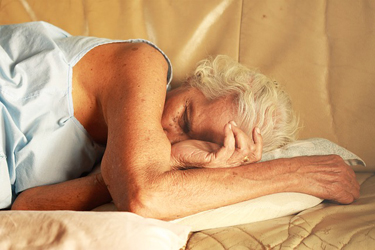How to Help Seniors Sleep Better

Numerous sleep studies have determined that people in their senior years need as much sleep as they ever did – approximately 8 hours per night – denying a popular assumption that less activity produces a need for less rest. This article will look at tips for how to help seniors sleep better, as well as the reasons that can lead to poor sleep habits in seniors.
While aging itself doesn’t cause poor sleep, common experiences among the elderly include lighter sleep, waking up more during the night, and finding it harder to fall back to sleep. A string of commonalities that are somewhat unavoidable, such as pain, medications, anxiety and lack of exercise, contribute to this phenomenon, along with a few other realities:
- Illnesses such as heart disease, lung disease and dementia can disrupt sleep, as can the medications typically prescribed for these conditions.
- Insomnia is a common side effect of stress and depression, and many elderly adults are stressed about such issues as death of friends, the financial ramifications of living longer, and the burden they feel they may be placing on their families.
- Caffeine is not tolerated as well as it was during younger years, so previously enjoyed indulgences such as tea, coffee, and chocolate can now contribute to sleeplessness.
- As adults age, advanced sleep phase syndrome causes the body’s internal clock to adjust to earlier bed and wakeup times, and seniors that continue to stay up as late as they did in their younger years end up sleep deprived.
How to Help Seniors Sleep Better
Fortunately, a few practical lifestyle tweaks can facilitate a “sleep zone” while also contributing to better overall health:
- For seniors who are mobile, taking a brisk walk or attending an exercise class geared toward older adults will not only increase strength and endurance, it will gradually increase the amount and quality of sleep they can expect and enjoy.
- Limiting naps to a 30-minute nap in the afternoon will contribute to the sleepy feeling needed to prompt a consistent bed time.
- Evening meals should be light, eaten at a set time, with the majority of liquids being consumed prior to the evening meal to minimize middle-of-the-night trips to the bathroom.
- Adding “white noise” such as a fan blowing or a sound track of ocean waves can help create a relaxed mode, and it can camouflage other noises that might be distracting.
- When weather permits, spending time in the sun is a key component to regulating the sleep/wake cycle.
- Due to a lessened metabolic rate, older adults don’t produce as much body heat as they used to and many stay cold as a result. Having plenty of bed covering can ensure warmth and comfort and facilitate the onset of sleep.
- Having medications changed altogether or the timing or dosage adjusted may also lessen the difficulty of falling and staying asleep.
If you are caring for a senior, implementing these tactics will make them feel that something is being done to address the sleeplessness issue, hopefully reducing the dread of bedtime and the anticipation of yet another restless night. That shift in perspective in itself can relieve some anxiety and produce positive results. After all, we never outlive the need for a good night’s sleep!


